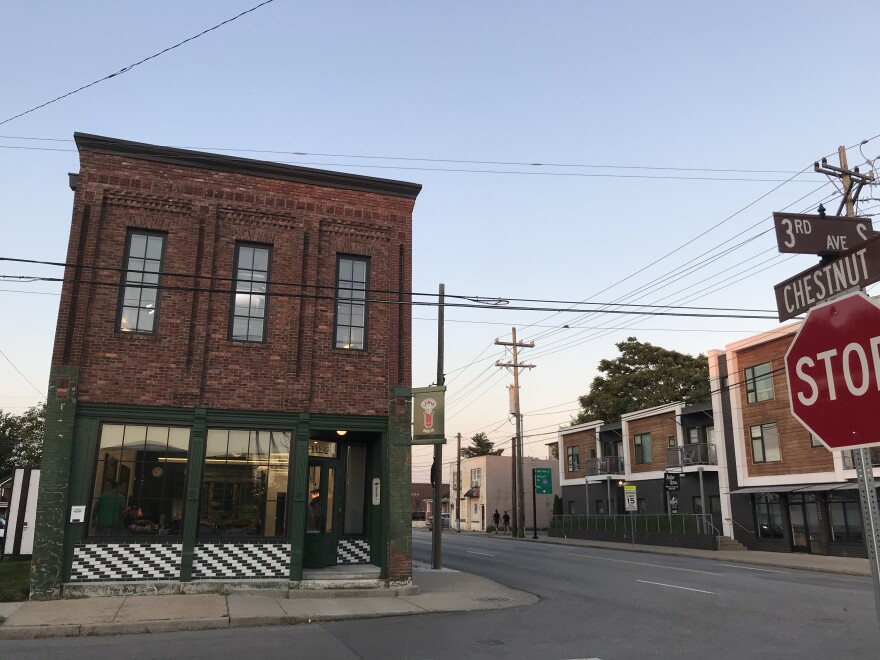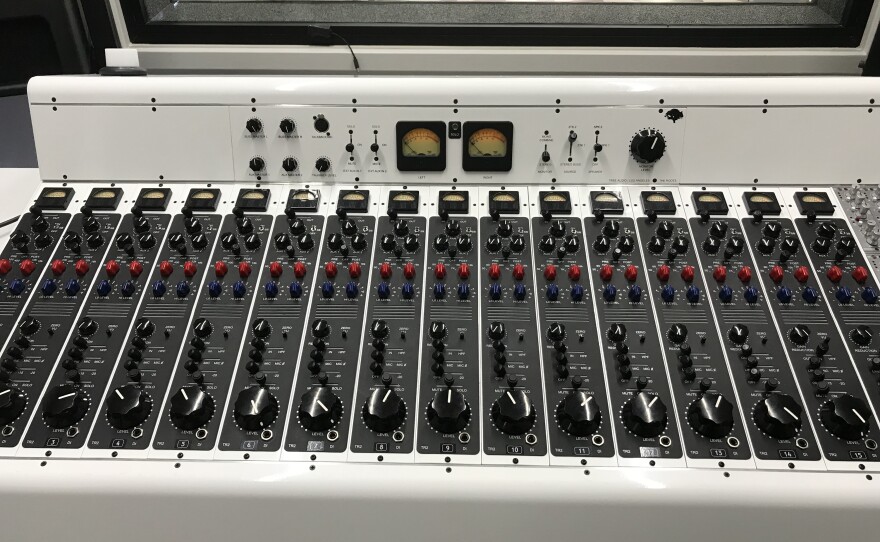Early this summer Kenneth Pattengale and Joey Ryan, the duo The Milk Carton Kids, invited a few dozen guests to a live showcase of a new album in a most unusual building. The two story structure, stood alone as if spared by history at the corner of 3rd Ave. South and Chestnut St at the edge of the fast-developing Wedgewood Houston district. It had intricate brickwork, tall narrow windows and a front door on the corner, reminiscent of the neighborhood family pharmacy that it had been for 90 years. The first floor was a hip living room where people mingled and looked at photos and artifacts from the pharmacy’s past. On the second floor was a pristine white room with a tile floor, high tech lighting and coveted vintage recording gear, set up for a live, full-band session.
The place, as the hand painted sign on the side of the building says, is Layman Drug Co., a meticulously appointed studio in a lovingly renovated building. It just celebrated one year in business, marking a good time to ask whether this is an expensive act of cultural philanthropy or a bet that Nashville’s vaunted studio ecosystem is bouncing back, after a decade of closures and lost business. When I visited recently with co-owner and proprietor Will Greig, he suggested it was a bit of both.
“I think it’s part of a trend,” Greig said. “A lot of the rooms (in Nashville) are booked 90 or 95 percent of the time. Maybe the budgets are shrinking for studio recordings. But they are booked.” He said his business, launched in partnership with a Miami development group, is “starting to break even, which is really exciting.”

In our full-length Q&A above, Greig says that succeeding with a studio now has less to do with the improving health of the record industry than with the challenges of getting noticed and recognized amid so much legacy competition. “I think the toughest part for a new studio is breaking through the loyalty barrier of people who have worked in a certain room for years,” he said, adding “I’m optimistic about the studio world in Nashville for sure.”
Music City’s world famous studio ecosystem began after WWII, 1946 to be exact, when engineers from WSM radio spun off Castle Recording, the city’s first full service studio. Owen Bradley built the first studio on what would become Music Row in 1955, inspiring others. By the 1960s, Nashville was one of the three most active recording centers in the nation, along with NY and LA. In the 1990s, when country music started generating truly huge money, Nashville built or expanded studio space exorbitantly, probably excessively. There were studios on and off Music Row, studios in the city and the country side, some of them palatial and luxurious.
Then the shakeout came. In the 2000s, the music economy crashed. Labels trimmed the lavish amounts they’d thrown at record making. Perhaps even more consequentially, digital tools gave rise to the home studio, where writers and artists could achieve much of what they’d once only been able to do in a full scale studio. Beloved outlets such as Sound Shop, Fireside Studio, 16 Ton and more shuttered. Historic RCA Studio A was saved from the wrecking ball only by a huge last minute infusion of private philanthropy.
But studio owners are saying the worst is behind them and that with a bounce-back of overall music industry revenue in the last few years, there is at last a sense of stability and even dynamism in the studio business. “The market is not bad,” said Brook Sutton, who opened The Studio in partnership with The Wood Brothers a few years ago on Charlotte pike in an old church. They moved in the past year to a nearby location with fewer compromises and upkeep issues. He says some months are better than others but he’s booking work. “There’s enough independent music that’s driving better budgets,” he said. “The DIY mentality has not (totally) left the bedroom, but there’s an uptick in people who want a bigger room and a large console.”
A similar message came from recording engineer Stephen Earnest, who partnered with two other colleagues to build Gnome Studios four and a half years ago in the Wedgewood Houston district, about a block from Layman Drug.
“It definitely took guts,” said Earnest, who saw the studio business dive while working at the famous Blackbird Studios in Berry Hill but who saw a turnaround in independent music during a stint at The Brown Owl, which opened in 2009. “We kind of watched it happen, and that’s what inspired us to have the confidence that people are renting studios.” Earnest said he’s also seen the pendulum swing against the constraints and subtly inferior sound of the bedroom/laptop approach. More artists want natural drum sounds and the energy that comes only from playing all together, capturing performances rather than assembled parts. And with studio rates softer than they once were, more are willing to pay for that.
One rule of thumb, sources said, was to assume the need for multiple streams of revenue, including private events and parties and video friendly technology. For Layman that meant installing an elaborate lighting system designed in consultation with videographers. Others, like the successful Welcome To 1979 in West Nashville, now open ten years, specialize in analog tape recording. That business added new commercial sidelines recently: restoring old but now in-demand tape machines and a vinyl mastering service. Still others, notably the very large and high-overhead Blackbird Studios via Blackbird Academy, have added education and training for recording engineers and aspiring producers.
“Everybody finds their own weird niche,” says Tim Cochran, who opened Trace Horse Studio in 2017 in Berry Hill. “If you’re going to open a studio today you need one of two things: deep pockets and not caring about profits, or having something else you can bring to the party. That means wearing multiple hats.” He says Trace Horse, which also emphasizes live to tape video shoots, was more a labor of musical love than a vote of confidence in the overall studio economy. “I’ll debate anybody who says it’s good to put your money in the studio business. For us it was about passion,” he said. “We just want to break even and view anything else as icing on the cake. On the other hand, we have a business plan.”
Watch Dustbowl Revival, recorded live at Layman Drug Co.
+





